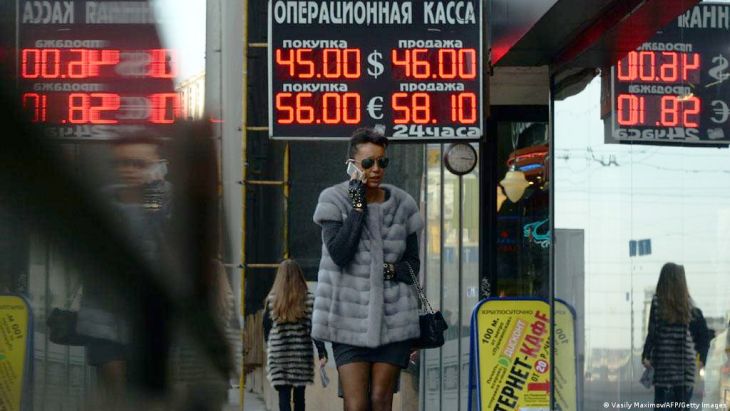The Russian economy is beginning a freefall as sanctions imposed by the West begin to bite. Already we see lineups at ATMs with Russians wanting to withdraw what are now almost worthless rubles before it all collapses.
Russia has a nest egg of about $650 billion in reserves in various currencies, but most of it is inaccessible given the freeze on Russian assets abroad. Putin’s back is against the wall, and this portends grave consequences for all should he decide that he has nothing to lose in attacking NATO countries that he sees as essential to reviving the old Soviet Empire – the Baltics to begin with and others in due course. With a desperate finger on the nuclear button, he is more dangerous than ever.
This has implications for the Western Hemisphere as well.
According to the Miami Herald, the sanctions could also end up punishing some of Moscow’s closest allies in Latin America: Nicaragua, Cuba and Venezuela. Financial experts point out that they have depended heavily on the Russian financial system to bypass their own U.S. sanctions. According to the Herald, the harshest blow would come out of the decision announced on on February 26th to bar 13 of Russia’s main banks from having access to the SWIFT network, used between banks for almost all international transactions.
When the Trump administration placed sanctions against the Nicolás Maduro regime, a significant number of Venezuelan government companies began to use Russian banks to make payments abroad, according to Venezuelan economist and opposition deputy José Guerra. “That means that if Petróleos de Venezuela, or any government entity, wants to make a payment to a European country through its Russian banks, now it cannot do so,” Guerra said.
Another blow to Venezuelan finances could come from the devaluation of the ruble which will likely continue to fall as sanctions continue to bite. “The shock to Venezuela would come from trying to exchange funds they might have in rubles into hard currency as they seek to move their funds to more stable places” Guerra said.
In addition to Venezuela, the measures announced over the weekend could also affect Cuba and Nicaragua, which have also come to rely on Russian banks, said Juan González, the Biden administration’s National Security Council Director for Western Hemisphere Affairs.
“The sanctions on Russia are so robust that they will have an impact on those governments that have economic affiliations with Russia, and that is by design,” González said in an interview with the Voice of America. “So Venezuela is going to start to feel that pressure, Nicaragua is going to start to feel that pressure, just like Cuba.”
Rising oil prices could benefit Maduro in the short term, although Venezuela’s oil infrastructure is weak after years of poor maintenance. Moreover, much of it is in the hands of Russian energy giants who have a substantial stake in this sector but who will not now be able to transfer funds to cover continuing expenses or process oil export revenues to recover their investment and Venezuela’s debts.
However, the visit to Venezuela by a delegation of senior U.S. diplomats this past weekend may lead to a different outcome for Venezuela. Maduro described the talks as good, and it is assumed that the U.S. objective may ultimately be to wean Venezuela off Russian support, modify the current sanctions regime to allow Venezuela to attract foreign companies to develop its vast oil and gas reserves, and sell the products in the open market, pocketing a windfall should prices continue to soar. This would allow the U.S. to supplant Russian oil and gas imports with Venezuelan products and create a rift between Russia and Venezuela much to the U.S.’s geopolitical advantage.
Speaking to reporters on Monday, White House press secretary said the purpose of a high-level U.S. delegation to Venezuela last weekend was to discuss a range of issues that included energy security and also the health and welfare of detained U.S. citizens.
"We're never going to miss an opportunity to do exactly that," she said. "And I will just note, in this scenario, that they are separate. They are separate paths and conversations." On Tuesday, the Maduro regime released two senior American oil executives held since 2017 on “terrorism” charges.
While rising oil prices could boost Maduro’s short-term prospects, inflation could bite in other Latin American countries, including client states Cuba and Nicaragua.
These countries have for years depended upon Russia for financial support in the face of U.S. sanctions. Russia has provided them with foreign aid, loans, and arms sales.
Access to these funds is now gone, and access to the Russian oil market to repay the massive investment Russian energy companies have in Venezuela will be impossible given the extent of the sanctions and the possibility that shipping Venezuelan oil to other markets will be constrained given Russia’s inability to act as a financial or transportation intermediary.
Hence Maduro’s decision.
These are still early days.
Let’s see where this takes the hemisphere.
Edicicón: Ana Ordaz
Proyectos realizados en el país tendrán incentivo fiscal de 30 % del ISR
La Jornada Maya
El célebre “Jefe Ratonero del Gabinete” ha servido a seis primeros ministros y se mantiene como figura entrañable del poder británico
Ap
El plan urbano propone una visión participativa y sostenible, abierta a ajustes mediante consulta ciudadana
Rosario Ruiz Canduriz
Comparsas, batucadas y carros alegóricos animaron el arranque; saldo blanco y amplia participación ciudadana
La Jornada Maya
